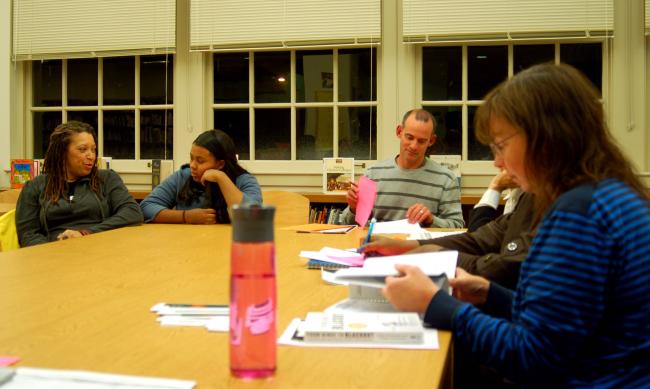Community group takes on teen drinking, substance abuse
Community members, students and activists discussed ways to mitigate underage alcohol consumption and substance abuse during a roundtable discussion Sept. 29. They called for more community involvement to help curb teen drinking. CLICK IMAGE TO VIEW MORE.
Wed, 09/30/2009
Teen alcohol and drug use took center stage Sept. 29 at Madison Middle School as concerned parents and members of several organizations brainstormed ways to confront substance abuse.
Several students returning from an anti-drug coalition conference spoke at the meeting, speaking about some incidents where high school students ended up in the hospital because of alcohol abuse.
Everyone agreed; teen drinking and marijuana use is a problem. The bigger problem, however, could be how to find a solution.
“The community is not taking this as a serious issue,” said Renae Gaines, a community coordinator for the Southwest Healthy Youth Partnership. “It really takes a whole community to make change.”
Members of the Southwest Healthy Youth Partnership won a federal grant during 2006, but the government plans to cease the program during this upcoming June. In the meantime, members brainstormed ways to increase community involvement—from both parents and students.
One parent answered that call when she showed up with ideas from an anti-drug conference that she attended with students from West Seattle high school. She expressed her hopes that the teens can venture into the community, speak at public schools and start spreading their knowledge.
“It’s not exactly saying ‘no drinking period,’” said Lars Stromberg, a West Seattle senior high school student. “It’s ‘how can we help our community?’”
Terese Machmiller, the parent chaperon at the conference, knew how difficult the alcohol question can be.
“Do I let [my children] go to a party where I know there are no adults?” she asked. “It’s like sending them into a hornet’s nest and telling them not to get stung.”
Much of the discussion revolved around ways to mitigate substance abuse through positive alternatives. For instance, one student suggested finding cheap alternative entertainment to “drinking in the park.”
Others at the meeting brought up the idea of modeling, or how parents can lead by example in showing their children about alcohol.
If parents spend hundreds of dollars to display alcohol in an expensive cabinet in a prominent place in the house, and then they fill that cabinet with shiny liquor bottles, that says something about the values the child is being taught, Gaines said.
These ideas, bantered about between a relatively small group of parents, turned into plans of action by the end of the meeting; the groups plan involvement with parents during student’s science, math and literacy study nights and they are hoping to involve both Madison Middle School and West Seattle high school parents with a pledge to keep alcohol out of the hands of minors.
The roundtable talk took special significance following the alcohol-related death of a former Madison Middle School teenager this past week. Gaines heard the teen had attended Madison Middle School, but did not hold yesterday’s meeting as a response to the death.
She said, however, that parents might realize this kind of tragedy could happen in West Seattle and she encouraged parents to become “fully engaged” by taking on projects with the community.




